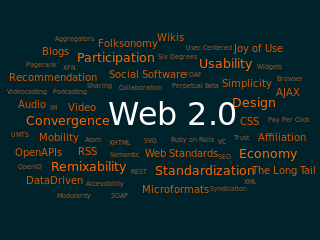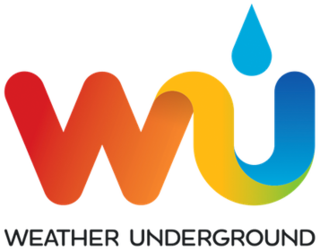
A blog is an informational website consisting of discrete, often informal diary-style text entries (posts). Posts are typically displayed in reverse chronological order so that the most recent post appears first, at the top of the web page. In the 2000s, blogs were often the work of a single individual, occasionally of a small group, and often covered a single subject or topic. In the 2010s, "multi-author blogs" (MABs) emerged, featuring the writing of multiple authors and sometimes professionally edited. MABs from newspapers, other media outlets, universities, think tanks, advocacy groups, and similar institutions account for an increasing quantity of blog traffic. The rise of Twitter and other "microblogging" systems helps integrate MABs and single-author blogs into the news media. Blog can also be used as a verb, meaning to maintain or add content to a blog.

Webmail is an email service that can be accessed using a standard web browser. It contrasts with email service accessible through a specialised email client software. Additionally, many internet service providers (ISP) provide webmail as part of their internet service package. Similarly, some web hosting providers also provide webmail as a part of their hosting package.
Blogger is an American online content management system founded in 1999 which enables its users to write blogs with time-stamped entries. Pyra Labs developed it before being acquired by Google in 2003. Google hosts the blogs, which can be accessed through a subdomain of blogspot.com. Blogs can also be accessed from a user-owned custom domain by using DNS facilities to direct a domain to Google's servers. A user can have up to 100 blogs or websites per account.
Domain hijacking or domain theft is the act of changing the registration of a domain name without the permission of its original registrant, or by abuse of privileges on domain hosting and registrar software systems.
Tucows Inc. is an American-Canadian publicly traded Internet services and telecommunications company headquartered in Toronto, Ontario, Canada, and incorporated in Pennsylvania, United States. The company is composed of three independent businesses: Tucows Domains, Ting Internet, and Wavelo.
The Smoking Gun is a website that posts legal documents, arrest records, and police mugshots on a daily basis. The intent is to bring to the public light information that is somewhat obscure or unreported by more mainstream media sources. Most of the site's content revolves around historical and current events, although it also features documents and photos relating to out-of-the-ordinary crimes and people.

Network Solutions, LLC, formerly Web.com is an American-based technology company and a subsidiary of Web.com, the 4th largest .com domain name registrar with over 6.7 million registrations as of August 2018. In addition to being a domain name registrar, Network Solutions provides web services such as web hosting, website design and online marketing, including search engine optimization and pay per click management.

Web 2.0 refers to websites that emphasize user-generated content, ease of use, participatory culture, and interoperability for end users.

Google Talk was an instant messaging service that provided both text and voice communication. The instant messaging service was variously referred to colloquially as Gchat, Gtalk, or Gmessage among its users.

Weather Underground is a commercial weather service providing real-time weather information over the Internet. It provides weather reports for most major cities around the world on its Web site, as well as local weather reports for newspapers and third-party sites.
Gizmo5 was a voice over IP communications network and a proprietary freeware soft phone for that network. On November 12, 2009, Google announced that it had acquired Gizmo5. On March 4, 2011, Google announced that the service would be discontinued as of April 3, 2011.

Meebo was an instant messaging and social networking service provider. It was founded in September 2005 by Sandy Jen, Seth Sternberg, and Elaine Wherry, and was based in Mountain View, California. Initially the company offered a web-based instant messenger service, extending its offer in more general online chat and even social networking directions. In June 2012, Google acquired Meebo to merge the company's staff with the Google+ developers team.
Comet is a web application model in which a long-held HTTPS request allows a web server to push data to a browser, without the browser explicitly requesting it. Comet is an umbrella term, encompassing multiple techniques for achieving this interaction. All these methods rely on features included by default in browsers, such as JavaScript, rather than on non-default plugins. The Comet approach differs from the original model of the web, in which a browser requests a complete web page at a time.

The public history of Gmail dates back to 2004. Gmail, a free, advertising-supported webmail service with support for Email clients, is a product from Google. Over its history, the Gmail interface has become integrated with many other products and services from the company, with basic integration as part of Google Account and specific integration points with services such as Google+, Google Calendar, Google Drive, Google Hangouts, Google Meet, YouTube, and Google Buzz. It has also been made available as part of G Suite. The Official Gmail Blog tracks the public history of Gmail from July 2007.

AboutUs.com is an inactive internet domain directory wiki. It lists websites along with information about their content. As a wiki, AboutUs allows Internet users to add entries or modify information. AboutUs.com has since become a wiki for more than just websites. The site allows pages to be created for people, places, and almost anything else.
Google Workspace is a collection of cloud computing, productivity and collaboration tools, software and products developed and marketed by Google. It consists of Gmail, Contacts, Calendar, Meet and Chat for communication; Drive for storage; and the Google Docs Editors suite for content creation. An Admin Panel is provided for managing users and services. Depending on edition Google Workspace may also include the digital interactive whiteboard Jamboard and an option to purchase add-ons such as the telephony service Voice. The education edition adds a learning platform Google Classroom and today has the name Workspace for Education. It previously included Google Currents for employee engagement.

Google Sites is a structured wiki and web page creation tool included as part of the free, web-based Google Docs Editors suite offered by Google. The service includes Google Docs, Google Sheets, Google Slides, Google Drawings, Google Forms, and Google Keep. Google Sites is only available on the web.

Matthew Rosenfeld, better known by the pseudonym Moxie Marlinspike, is an American entrepreneur, cryptographer, and computer security researcher. Marlinspike is the creator of Signal, co-founder of the Signal Technology Foundation, and served as the first CEO of Signal Messenger LLC. He is also a co-author of the Signal Protocol encryption used by Signal, WhatsApp, Google Messages, Facebook Messenger, and Skype.
Google Kythe is a source code indexer and cross-referencer for code comprehension which describes itself as a "pluggable, (mostly) language-agnostic ecosystem for building tools that work with code".









